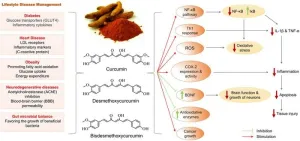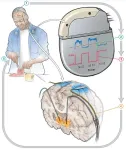(Press-News.org) People with Down syndrome are likely to develop Alzheimer’s disease at a young age, with autopsy studies showing that by age 40 years, the brains of individuals with Down syndrome have amyloid plaques. Yet people with Down syndrome have been excluded from or underrepresented in clinical trials of new therapies for treating AD. Lecanemab, which has been shown to target and remove beta-amyloid plaques, has been approved by the U.S. Food and Drug Administration to treat AD early in the disease’s progression. A new study led by investigators at Brigham and Women’s Hospital (a founding member of the Mass General Brigham healthcare system) and University of California, Irvine tested lecanemab to see if it could bind to amyloid plaques in tissue samples from people with Down syndrome, finding that it effectively targeted amyloid in all 15 samples. However, the drug also bound to brain blood vessels, which raises safety concerns. Results are published in JAMA Neurology.
“Our study is highly clinically relevant, as we focus on the usage of a recently approved disease modifying therapy for Alzheimer’s disease, lecanemab, in people with Down syndrome,” said co-corresponding author Lei Liu, MD, PhD, of the Department of Neurology at Brigham and Women’s Hospital.
“Our findings underscore the exciting promise of anti-amyloid drugs for helping people with Down syndrome, but also the need for careful consideration of safety, especially the risk of hemorrhagic complications,” said co-corresponding author Elizabeth Head, PhD, of the Department of Pathology and Laboratory Medicine at University California, Irvine.
The research team evaluated brain tissue samples from 15 people with Down syndrome who were between the ages of 43 and 68 years. The study was limited in its sample size and age range—in the future, the researchers hope to expand the study to include samples from younger brain donors to determine if age may be a factor in the drug binding to blood vessels. The team also plans to evaluate the drug’s binding profile in people with late-onset AD to see if it follows a similar pattern. The research team expresses its gratitude to the people with Down syndrome for their gift of brain donation.
Disclosures: Dr. Head has served as a scientific advisor for Cyclotherapeutics and Alzheon and is funded by the National Institutes of Health. Dr. Liu is funded by the National Institutes of Health.
Funding: This work was funded by National Institutes of Health grants P30AG066519, U19AG068054, RF1AG079519, R01 AG071865, RF1 AG079569, K08 AG065502, DP2 AG086138, and R01 082346, and Doris Duke Foundation 2021183.
Paper cited: Liu L et al. “Lecanemab and Vascular-Amyloid Deposition in Brains of People with Down Syndrome” JAMA Neurology DOI: 10.1001/jamaneurol.2024.2579
END
Research study examines Alzheimer’s disease drug on tissue samples from people with Down syndrome
The anti-amyloid drug lecanemab bound to amyloid plaques but also bound to blood vessels, suggesting that safety and efficacy need to be closely evaluated
2024-08-19
ELSE PRESS RELEASES FROM THIS DATE:
International Society of Biomechanics recommendations for wearables-based motion capture
2024-08-19
Dr. Reed Gurchiek, an Assistant Professor in the Department of Bioengineering, Clemson University, and an Early-stage Investigator, was a co-first author of a recent publication in the Journal of Biomechanics titled “International Society of Biomechanics recommendations on the definition, estimation, and reporting of joint kinematics in human motion analysis applications using wearable inertial measurement technology”. A collaborative effort that incorporated feedback from the biomechanics community has produced recommendations in five categories: sensor characteristics ...
Rutgers researchers discover new way to control the sense of touch
2024-08-19
Rutgers researchers have found a new way to manage the receptors that control the sense of touch, which could lead to treating chronic pain more effectively.
“Identifying a natural molecule that specifically reduces pain sensitivity offers hope for new therapeutic strategies in the management of pain,” said Tibor Rohacs, a professor in the Department of Pharmacology, Physiology and Neuroscience at Rutgers New Jersey Medical School and a member of the Rutgers Brain Health Institute. “Our goal is to translate these findings into effective treatments that improve the quality of life for people suffering from chronic ...
New UH study targets early signs of vision loss in diabetic patients
2024-08-19
A $3.3 million study at the University of Houston College of Optometry will track the health of patients with prediabetes and diabetes to find out who might develop eye problems and be at risk for future vision loss. The study is being led by Wendy Harrison, associate professor, and is underwritten by the National Eye Institute.
Vision loss in type 2 diabetes results from diabetic retinopathy, caused by damage to blood vessels in the retina, the light-sensitive layer of tissue in the back of your eye. The disease can appear without warning.
“The ...
Herbal-based nutraceuticals in management of lifestyle diseases: Experience from Indian population
2024-08-19
Lifestyle diseases, also known as non-communicable diseases (NCDs), have emerged as a major health burden globally, including in India. These diseases, such as obesity, diabetes, hypertension, cardiovascular diseases, and metabolic disorders, are primarily caused by unhealthy lifestyle choices like sedentary behavior, poor dietary habits, and stress. According to the World Health Organization (WHO), NCDs are responsible for 41 million deaths annually, accounting for 74% of all global deaths. Notably, 86% of these premature deaths occur in low- and middle-income countries.
The increasing prevalence of lifestyle diseases ...
Taming Parkinson’s disease with intelligent brain pacemakers
2024-08-19
Media Contact: Robin.Marks@ucsf.edu, (415) 502-6397
Subscribe to UCSF News
Taming Parkinson’s Disease with Intelligent Brain Pacemakers
UCSF studies show personalized, self-adjusting, neuromodulation has the potential to enhance movement and sleep.
Two new studies from UC San Francisco are pointing the way toward round-the-clock personalized care for people with Parkinson’s disease through an implanted device that can treat movement problems during the day and insomnia at night.
The approach, called adaptive deep brain stimulation, or aDBS, uses methods derived from AI to ...
Self-adjusting brain pacemaker may help reduce Parkinson’s disease symptoms
2024-08-19
A small feasibility study funded by the National Institutes of Health (NIH) found that an implanted device regulated by the body’s brain activity could provide continual and improved treatment for the symptoms of Parkinson’s disease (PD) in certain people with the disorder. This type of treatment, called adaptive deep brain stimulation (aDBS), is an improvement on a technique that has been used for PD and other brain disorders for many years. The study found aDBS was markedly more effective at controlling PD symptoms compared to conventional DBS treatments.
“This study marks a big step forward towards ...
Florida’s red flag gun law and firearm and nonfirearm homicide and suicide rates
2024-08-19
About The Study: Although firearm homicide mortality increased after Florida’s red flag law enactment (permitting the temporary removal of firearms by law enforcement officers from individuals posing a danger to themselves or others), this increase was lower than expected compared with its synthetic control, resulting in an 11% rate reduction (0.73 fewer deaths per 100,000). There were no differences from expected mortality rates for nonfirearm homicide, firearm suicide, or nonfirearm suicide.
Corresponding Author: To contact the corresponding author, Catherine Gimbrone, MPH, email c.gimbrone@columbia.edu.
To ...
Number of pediatric inpatient psychiatric beds in the U.S. did not increase 2017-2020 despite youth mental health crisis
2024-08-19
U.S. pediatric inpatient psychiatric bed capacity did not change 2017 – 2020, despite increases in pediatric mental health emergency visits, according to a study published in JAMA Pediatrics. Researchers also found substantial geographic variation in inpatient psychiatric bed capacity per 100,000 children, ranging from zero in Alaska to 75 in Arkansas. Over 90 percent of pediatric inpatient beds are in urban centers, raising concerns for youth living in rural areas.
“Access to psychiatric inpatient care for youth is insufficient to meet the growing demand, forcing patients to wait for hours or even days in emergency departments or on medical units until a psychiatric bed becomes ...
Using temporary nurses doesn’t mitigate deaths linked with staff shortages
2024-08-19
A new study led by the University of Southampton has found that using temporary nursing staff to fill rotas only partially combats an increased risk of patient death associated with staff shortages.
Researchers found that avoiding low nurse staffing levels lowers the risk of death among patients – particularly even when drafting in temporary registered nurses to maintain staffing levels. However, despite this, the risk of death remains elevated compared to when the ward is fully staffed by permanent nurses.
Findings from the ...
Telehealth mindfulness-based interventions for chronic pain
2024-08-19
About The Study: Scalable telehealth mindfulness-based interventions improved pain-related function and biopsychosocial outcomes compared to usual care among veterans with chronic pain in this randomized clinical trial. Relatively low-resource telehealth-based mindfulness-based interventions could help accelerate and improve the implementation of nonpharmacological pain treatment in health care systems.
Corresponding Author: To contact the corresponding author, Diana J. Burgess, PhD, email diana.burgess@va.gov.
To access the embargoed study: Visit our For The Media website ...
LAST 30 PRESS RELEASES:
Invisible battery parts finally seen with pioneering technique
Tropical forests generate rainfall worth billions, study finds
A yeast enzyme helps human cells overcome mitochondrial defects
Bacteria frozen in ancient underground ice cave found to be resistant against 10 modern antibiotics
Rhododendron-derived drugs now made by bacteria
Admissions for child maltreatment decreased during first phase of COVID-19 pandemic, but ICU admissions increased later
Power in motion: transforming energy harvesting with gyroscopes
Ketamine high NOT related to treatment success for people with alcohol problems, study finds
1 in 6 Medicare beneficiaries depend on telehealth for key medical care
Maps can encourage home radon testing in the right settings
Exploring the link between hearing loss and cognitive decline
Machine learning tool can predict serious transplant complications months earlier
Prevalence of over-the-counter and prescription medication use in the US
US child mental health care need, unmet needs, and difficulty accessing services
Incidental rotator cuff abnormalities on magnetic resonance imaging
Sensing local fibers in pancreatic tumors, cancer cells ‘choose’ to either grow or tolerate treatment
Barriers to mental health care leave many children behind, new data cautions
Cancer and inflammation: immunologic interplay, translational advances, and clinical strategies
Bioactive polyphenolic compounds and in vitro anti-degenerative property-based pharmacological propensities of some promising germplasms of Amaranthus hypochondriacus L.
AI-powered companionship: PolyU interfaculty scholar harnesses music and empathetic speech in robots to combat loneliness
Antarctica sits above Earth’s strongest “gravity hole.” Now we know how it got that way
Haircare products made with botanicals protects strands, adds shine
Enhanced pulmonary nodule detection and classification using artificial intelligence on LIDC-IDRI data
Using NBA, study finds that pay differences among top performers can erode cooperation
Korea University, Stanford University, and IESGA launch Water Sustainability Index to combat ESG greenwashing
Molecular glue discovery: large scale instead of lucky strike
Insulin resistance predictor highlights cancer connection
Explaining next-generation solar cells
Slippery ions create a smoother path to blue energy
Magnetic resonance imaging opens the door to better treatments for underdiagnosed atypical Parkinsonisms
[Press-News.org] Research study examines Alzheimer’s disease drug on tissue samples from people with Down syndromeThe anti-amyloid drug lecanemab bound to amyloid plaques but also bound to blood vessels, suggesting that safety and efficacy need to be closely evaluated


